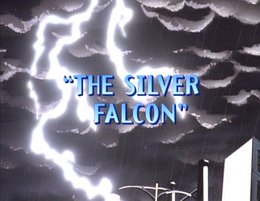Difference between revisions of "The Silver Falcon"
Supermorff (talk | contribs) (→Continuity) |
m (spelling) |
||
| Line 19: | Line 19: | ||
Broadway's trenchcoat and fedora were partly inspired by the similar outfit of Ben Grimm aka "The Thing" from the Fantastic Four in Marvel Comics, who wore it to disguise his "monstrous" appearance when in public. | Broadway's trenchcoat and fedora were partly inspired by the similar outfit of Ben Grimm aka "The Thing" from the Fantastic Four in Marvel Comics, who wore it to disguise his "monstrous" appearance when in public. | ||
| − | A line that rewards subsequent | + | A line that rewards subsequent re-viewings: [[G.F. Benton|Benton]] refers to [[Dominic Dracon]] in the 1920s photograph of him and [[Mace Malone]] as a "sharp-looking young feller" - which takes on a new meaning when it is revealed at the end that Benton was really Dominic in disguise! |
The notion of Benton being Dominic in disguise entered the episode late in its development; originally, he really was the CPA that he appeared to be. However, the production team realized that [[Elisa Maza|Elisa]] needed her own antagonist to face at the end (Broadway taking care of Tony and [[Matt Bluestone|Matt]] of [[Pal Joey]]), and so added the revelation of Benton's true identity in Act Three. | The notion of Benton being Dominic in disguise entered the episode late in its development; originally, he really was the CPA that he appeared to be. However, the production team realized that [[Elisa Maza|Elisa]] needed her own antagonist to face at the end (Broadway taking care of Tony and [[Matt Bluestone|Matt]] of [[Pal Joey]]), and so added the revelation of Benton's true identity in Act Three. | ||
Revision as of 15:26, 9 December 2007
"The Silver Falcon" is the nineteenth televised episode of the series Gargoyles, and the sixth episode of Season 2. It originally aired on September 12, 1995.
- Story: Cary Bates
Contents
Summary
Continuity
Beginning in this episode, Tony Dracon now sports a white streak in the middle of his hair. According to Greg Weisman, this was to make him stand out better, since he'd thought that Tony had appeared a little too bland in "Deadly Force"; the in-story rationale was that the streak was due to his shock at encountering the gargoyles for the first time. (Greg briefly considered also giving Glasses a similar streak, but decided against it, simply because Glasses did not need it; he had been a distinctive figure from the start.)
Broadway has begun taking reading lessons after "A Lighthouse in the Sea of Time", enough to read and understand Mace Malone's note to the Dracons (though he has some understandable difficulty in pronouncing the word "right").
Mace Malone is mentioned for the first time, and a black-and-white photograph of him is seen, although Mace does not appear in person until "Revelations".
Martin Hacker is introduced as Matt Bluestone's former partner in the FBI. He reappears in "Revelations".
Tidbits
Broadway's trenchcoat and fedora were partly inspired by the similar outfit of Ben Grimm aka "The Thing" from the Fantastic Four in Marvel Comics, who wore it to disguise his "monstrous" appearance when in public.
A line that rewards subsequent re-viewings: Benton refers to Dominic Dracon in the 1920s photograph of him and Mace Malone as a "sharp-looking young feller" - which takes on a new meaning when it is revealed at the end that Benton was really Dominic in disguise!
The notion of Benton being Dominic in disguise entered the episode late in its development; originally, he really was the CPA that he appeared to be. However, the production team realized that Elisa needed her own antagonist to face at the end (Broadway taking care of Tony and Matt of Pal Joey), and so added the revelation of Benton's true identity in Act Three.
Broadway turns to stone in the daytime even while underground, without any exposure to sunlight. This illustrates that it is not the sun that turns the gargoyles to stone, but (according to Greg) their internal biological clocks.
Links
| << Previous Episode: "The Mirror" | Next Episode: "Eye of the Beholder" >> |
